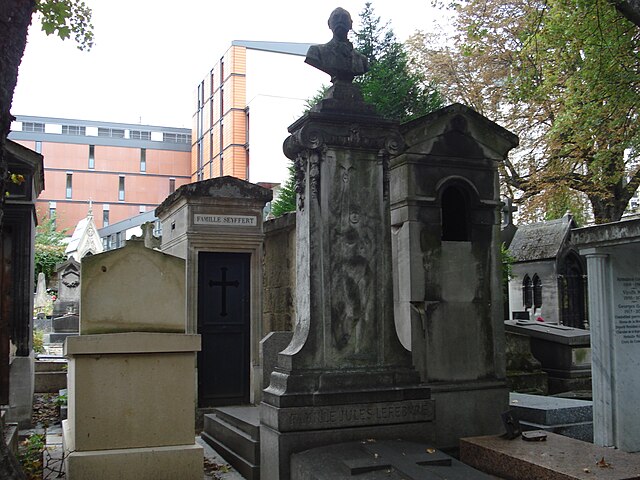Loading AI tools
French painter, educator and theorist From Wikipedia, the free encyclopedia
Jules Joseph Lefebvre (French: [ʒyl ʒozɛf ləfɛvʁ]; 14 March 1836 – 24 February 1911) was a French painter, educator and theorist.
You can help expand this article with text translated from the corresponding article in French. (June 2020) Click [show] for important translation instructions.
|
Jules Joseph Lefebvre | |
|---|---|
 A photo of Lefebvre taken no later than 1903 | |
| Born | 14 March 1836[1] Tournan-en-Brie, Seine-et-Marne, France |
| Died | 24 February 1911 (aged 74)[1][2] Paris, France |
| Other names | Jules Lefebvre[2] |
| Occupation | Painter |
| Signature | |

Lefebvre was born in Tournan-en-Brie, Seine-et-Marne, on 14 March 1836.[1] He entered the École nationale supérieure des Beaux-Arts in 1852 and was a pupil of Léon Cogniet.
He won the prestigious Prix de Rome with his The Death of Priam in 1861. Between 1855 and 1898, he exhibited 72 portraits in the Paris Salon. Many of his paintings are single figures of beautiful women. Among the portraits of his considered the best were those of M. L. Reynaud and the Prince Imperial (1874).[3] In 1891, he became a member of the French Académie des Beaux-Arts.
He was professor at the Académie Julian in Paris.[4] Lefebvre is chiefly important as an excellent and sympathetic teacher who numbered many Americans among his 1500 or more pupils. Among his famous students were Fernand Khnopff, Kenyon Cox,[3] Félix Vallotton, Ernst Friedrich von Liphart,[5] Georges Rochegrosse,[6] the Scottish-born landscape painter William Hart, Walter Lofthouse Dean, and Edmund C. Tarbell, who became an American Impressionist painter.[7] Another pupil was the miniaturist Alice Beckington[8] as was Laura Leroux-Revault, the daughter of his friend Louis Hector Leroux.[9] Jules Benoit-Lévy entered his workshop at the École nationale supérieure des Beaux-Arts.[10]


Lefebvre died in Paris on 24 February 1911 and was buried in the Montmartre Cemetery with a bas-relief depiction of his painting La Vérité on his grave.[1][2]

Seamless Wikipedia browsing. On steroids.
Every time you click a link to Wikipedia, Wiktionary or Wikiquote in your browser's search results, it will show the modern Wikiwand interface.
Wikiwand extension is a five stars, simple, with minimum permission required to keep your browsing private, safe and transparent.